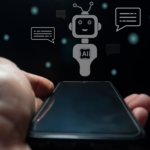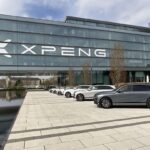March 20-23, Shanghai – The China Home Appliances and Consumer Electronics Expo (AWE 2025) is currently being held in Shanghai, with leading domestic and international brands such as TCL, Hisense, Haier, and Samsung showcasing their latest cutting-edge technologies. AI integration has become a prevailing trend, with most newly launched home appliances featuring AI functionalities—ranging from AI-powered televisions and dynamically temperature-adjusting air conditioners to high-precision obstacle-avoiding robotic vacuums. AI is redefining traditional home appliances.
AI Becomes the Core Trend in Home Appliances
“The rapid advancement of artificial intelligence is reshaping the home appliance industry, and large home appliances, in particular, have become the focal point of technological innovation,” said Pei Dongmin, Vice General Manager of the Home Appliance Division at AVC.
AI-Powered Televisions: Entering the AI Wall Era
AI integration in televisions is now standard. Hisense has achieved full AI integration in its TVs, pioneering the connection between its large displays and DeepSeek. “At this year’s AWE, all large screens at the Hisense booth are powered by AI, making user interactions more seamless and intelligent. The 100-inch immersive audiovisual experience is bringing users back to big screens. We have now entered the AI Wall era,” said Hisense President Li Wei.
AI-Enhanced Refrigerators, Air Conditioners, and Washing Machines
Haier’s refrigerators are now integrated with the DeepSeek AI model. According to the company, this AI-enhanced refrigeration system can provide intelligent food storage recommendations, personalized dietary planning, and real-time monitoring of food freshness.
AI is playing a crucial role in air conditioning, particularly in energy efficiency. Gree’s AI Dynamic Energy-Saving Air Conditioner utilizes a dedicated AI-powered chip and advanced algorithms to continuously adapt to environmental and user behavior changes, optimizing energy usage in real-time. A company representative noted that the energy consumption difference between models with and without the AI chip can reach up to 13.6%.
Changhong’s AI air conditioner takes energy efficiency a step further by autonomously adjusting temperatures between day and night. “The core technology behind this feature is AI-based low-frequency torque control, which allows the air conditioner to operate continuously at low power during the night when cooling demands are lower,” a company spokesperson explained. The AI-driven model boasts an impressive energy savings rate of up to 42%. While not yet in mass production, it is expected to hit the market later this year.
In the laundry segment, TCL launched the AI Super Drum Washer-Dryer T7R Pro, featuring its self-developed Fuxi AI model. The washing machine leverages a vast AI training database with over 100 billion parameters, enabling precise identification of clothing weight, fabric type, and stain levels. It can dynamically adjust washing conditions using 4,320 different parameter combinations to optimize performance. Additionally, the AI model learns user habits over time, making the machine more efficient with continued use.
AI in Kitchen Appliances and Wearable Technology
Industry-specific AI models are also gaining traction. Robam introduced its AI cooking model, “God of Cooking,” which features multi-modal interactions, food ingredient recognition, and customized meal planning based on users’ health reports. It can accurately identify over 1,000 types of ingredients to refine personalized dietary suggestions.
Meanwhile, AI-powered smart glasses remain a key attraction at the expo. Thunderbird unveiled several new AI and AR glasses, including the V3 AI Camera Glasses, which leverage a dedicated AI model co-developed with Alibaba’s Tongyi AI. This marks the first AI model designed specifically for smart glasses applications.
As AWE 2025 unfolds, it is evident that AI is reshaping the home appliance industry, bringing unprecedented intelligence, efficiency, and user experience to everyday life.




